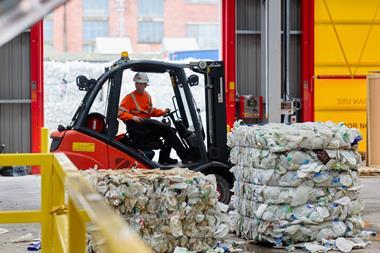A new carbon emissions scheme will unwittingly hit the chemical industry. The UK risks being at a disadvantage if industry is overburdened with regulation, warns Chris Reynolds
A new carbon emissions scheme will unwittingly hit the chemical industry. The UK risks being at a disadvantage if industry is overburdened with regulation, warns Chris Reynolds

In April 2010, a new ’cap and trade’ carbon emissions scheme - the Carbon reduction commitment (CRC) - will hit most businesses in the UK. CRC will fill an existing policy gap and regulate energy efficiency in businesses not already regulated. It shouldn’t impact energy-intensive sectors already regulated under climate change agreements (CCAs) or the EU emissions trading scheme (ETS). But the phrase ’shouldn’t impact’ has very different meanings for governments and regulators than it does for businesses. The problem with CRC is that, as a ’catch all’ regulation, it requires you to work hard just to be exempt.
Companies using more than 6000 MWh of electricity from half-hourly meters during 2008 will be required to participate in CRC from 2010, but participants with CCAs will be exempt and EU ETS emissions will also be excluded. As so often, the devil is in the detail and, unless you fall below the 6000 MWh threshold, you will be required to register and pay, even if you subsequently become exempt. This is a bit like requiring everybody in the UK over the age of 10 to pay for a passport, regardless of whether they ever travel abroad.
Uneven playing field
CRC is another administrative burden placed on businesses in the UK. While most would agree with the principles of carbon emission reduction and of ensuring all businesses are covered equally by regulations, it still remains that much of the world’s industry is competing without the burden of carbon taxation and capped emissions. CRC will add another unwelcome layer of administrative burden for companies in the chemical and pharmaceutical sectors - companies that CRC isn’t really intended to influence.
Carbon export
To make matters worse, the UK’s chemical and pharmaceutical sectors are net exporters, so to a large extent the products of these sectors need not count as part of the UK’s carbon footprint at all. The danger is that the UK will be at a competitive disadvantage if the burden on industry to reduce carbon emissions is disproportionate to that in other parts of society, and if the burden is greater in the UK than in other parts of the world. And if this competitive disadvantage leads to carbon leakage - the shifting of emissions from carbon-regulated countries to unregulated ones - then it is unlikely to save any carbon at all.
A recent report from the International Council of Chemical Associations (ICCA) - prepared by management consultancy firm McKinsey & Co and the ?ko Institut in Germany - concluded that for every unit of greenhouse gases emitted directly and indirectly by the chemical industry, the industry enabled 2-3 units of emission savings via the products and technologies provided to other industries and consumers.1 Furthermore, the carbon saving:cost ratio is expected to double by 2030 as the world demands more of the products that provide carbon abatement solutions. Thus, it is important that the chemical industry, which the ICCA report estimates to have reduced world carbon emissions by 8-11 per cent in 2005, is not disproportionately penalised by an over-reliance on administratively complicated carbon emission regulations.
It would be particularly tragic if a country such as the UK, which has a low carbon industrial strategy and seeks to provide products and technologies for carbon emission abatement, should, in saving a little bit of CO2, lose innovation potential, export benefits, and manufacturing jobs.
While taking a global lead on carbon reduction is laudable, we should be careful that carbon reduction regulation does not provide perverse incentives, that it is based on an accurate picture of emissions ownership, and that it doesn’t burden industry unfairly. In short, industry needs, at this time more than ever, a level playing field. The CRC is an example of a regulation that will burden this industry with virtually zero benefit.
Chris Reynolds is competitiveness and climate change executive at the Chemical Industries Association, UK
References
1. Innovations for greenhouse gas reductions












No comments yet